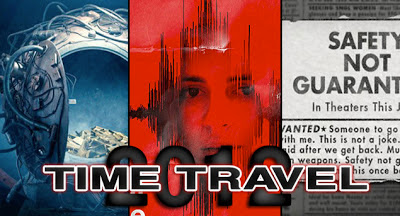Love/Hate Relationship with Time Travel
A few weeks ago I wrote a post on my film blog -Filmcast Without a Cause for those who aren't in the know- about three trendy films that came out this year that used time travel in interesting ways; Looper, Sound of my Voice and Safety Not Guaranteed. As the year is coming to a close, top 10 lists are trickling out and each of these films is getting some love. While I'm not here to rehash my thoughts on these films, I would like to go super nerdy on you and talk about my preferred time travel logic, which can be best described through parallel universes. I could use my wikipedia knowledge of the Novikov self-consistency principle to explain it, but instead I'll go with the poetic words of Jurassic Park's Dr. Ian Malcolm when he said "Life finds a way."
Before I go to deeply into this thought, allow me to present one of my favorite illustrations of how traveling back in time to change the past would impact the future. Where do I turn for my example? Well comic books of course.
In the 2006 Fantastic Four issue "A Death in the Family" a common comic book trick is pulled where a super-powered favorite is slayed, but instead of milking this trick for months, FF sets everything right within a few pages. In the above excerpt we see some mysterious inter-dimensional creature kill Sue Storm. A few pages later, a guilty Johnny Storm travels through time to save his sister. And if you follow the illustrations you see that he is successful, or is he...
How tragic indeed Mr. Fantastic! Tragic because your author, Karl Kesel, left out some important information. Far be it for me to tell a genius he's wrong -even a fictional one such as Dr. Reed- but where does he think Johnny Storm is returning to? First, if we combine Dr. Malcolm and the Fantastic Elastic Man's ideas we get an answer to the ever persistent concern of time traveling; paradoxes. If you go back in time and kill your grandpa, will you cease to be? Well ask Doctors Malcolm or Richards that question and you will most definitely receive a hard and fast N-O.
Changing the past doesn't mean the future is changed, only that history becomes bifurcated at point where to you travel back in time to. Think of Back to the Future, when Marty travels back in time and violently alters the manner in which his parents get together, it wouldn't erase the plain of existence he came from, he's physical evidence that it happened, he simply splits time into two different universes, like Sliding Doors without a mopey Gwyneth Paltrow. There's the universe where the McFly family are a group of sad losers and the universe where George McFly is a heroic science fiction author.
So illustrating Dr. Malcolm's point, Life -or in this case Physics- found a way. The Paradox of Marty being potentially erased from history isn't a concern because both the timeline he was originally from exists, and the future he returned to at the end of the film, exist. This is where Reed Richards (or acurately the man who wrote him) makes his mistake. For a quick refresher, here's what Reed said about Johnny altering the past.
"The past can't be changed. When that Johnny came back in time, he SPLIT the timeline. He may have prevented something from happening here, but in his own timeline nothing changed. Nothing will be better."
The error is actually unspoken, Johnny won't be returning to his original timeline. Everything Mr. Fantastic says is correct, but the worst part is Johnny will never be able to return to his original timeline, he'll always be the other universe Johnny, stuck in the future of the timeline he altered.
Obviously I'm not a theoretical physicist, but am I a man who likes stories to be logical. So on your next viewing of Looper and the future version of Paul Dano starts losing limbs because his former self is being dismembered, feel free to shout out BALDERDASH! Future Dano severed himself from the causality of that timeline the moment he traveled into the past. While it would be quite a mindtrip to know an alternate version of yourself is being sawed in half, that simply does not fly when it comes to logical time travel.






Comments